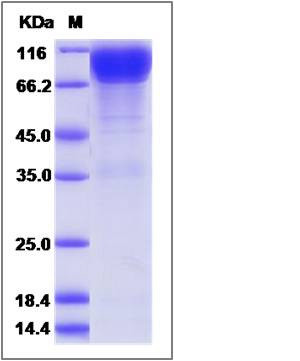Rhesus IL17RA / IL17R Protein (Fc Tag)
IL17RA
- 100ug (NPP2931) Please inquiry
| Catalog Number | P90127-C02H |
|---|---|
| Organism Species | Rhesus |
| Host | Human Cells |
| Synonyms | IL17RA |
| Molecular Weight | The recombinant rhesus IL17RA comprises 529 amino acids and has a calculated molecular mass of 60.3 KDa. |
| predicted N | Leu 33 |
| SDS-PAGE |  |
| Purity | > 90 % as determined by SDS-PAGE |
| Protein Construction | A DNA sequence encoding the rhesus IL17RA (XP_001102483.1) (Met1-Trp320) was expressed, fused with the Fc region of human IgG1 at the C-terminus. |
| Bio-activity | Immobilized human IL17A (P12047-HNAS) at 10 μg/ml (100 μl/well) can bind Rhesus IL17RA-Fc, The EC50 of Rhesus IL17RA-Fc is 0.19-0.43 μg/ml. |
| Research Area | Immunology |Adaptive Immunity |T Cell |T Cell CD Antigen |CD Antigen (Helper T Cells) |
| Formulation | Lyophilized from sterile PBS, pH 7.4 1. Normally 5 % - 8 % trehalose, mannitol and 0.01% Tween80 are added as protectants before lyophilization. Specific concentrations are included in the hardcopy of COA. |
| Background | Interleukin-17 receptor (IL-17R), also known as Interleukin-17 receptor A (IL-17RA) and CD217 antigen (CD217), is a cytokine receptor which binds interleukin 17. IL-17R/IL-17RA (CD217) is a proinflammatory cytokine secreted by activated T-lymphocytes. It is a potent inducer of the maturation of CD34-positive hematopoietic precursors into neutrophils. IL-17R/IL-17RA (CD217) is a ubiquitous type I membrane glycoprotein that binds with low affinity to interleukin 17A. Interleukin 17A and its receptor IL-17RA play a pathogenic role in many inflammatory and autoimmune diseases such as rheumatoid arthritis. Like other cytokine receptors, this receptor likely has a multimeric structure. Defects in IL-17R/IL-17RA (CD217) are the cause of familial candidiasis type 5 (CANDF5). CANDF5 is a rare disorder with altered immune responses and impaired clearance of fungal infections, selective against Candida. It is characterized by persistent and/or recurrent infections of the skin, nails and mucous membranes caused by organisms of the genus Candida, mainly Candida albicans. |
| Reference |
